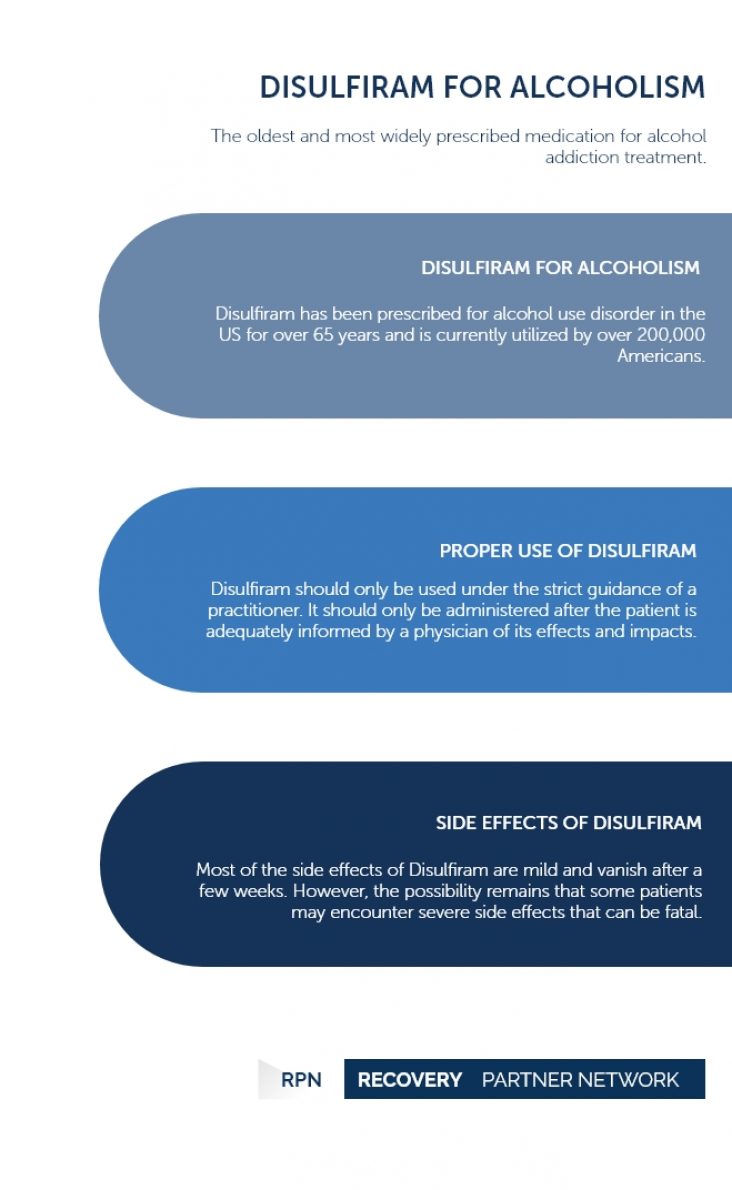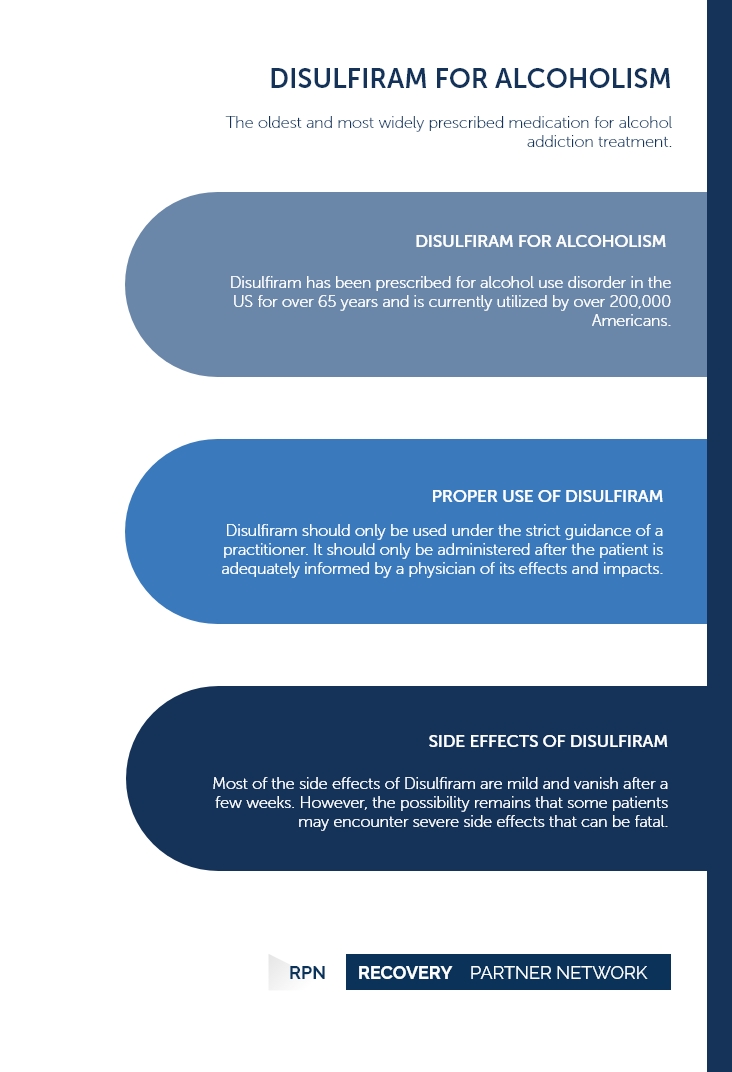The oldest and most widely prescribed medication for alcohol addiction treatment.
Disulfiram for Alcoholism
Disulfiram for Alcoholism | Table of Contents
Disulfiram for Alcoholism
Disulfiram, also known as Antabuse or tetraethylthiuram disulfide, has been prescribed for alcohol use disorder in the US for over 65 years and is currently utilized by over 200,000 Americans. Disulfiram functions by disrupting the body’s metabolism and the absorption of alcohol, which then produces a sequence of particularly adverse reactions in the process. When a person who is on Disulfiram consumes alcoholic beverages, they may begin to experience:
- Nausea, severe vomiting
- Shortness of breath (can occur even with mild exertion)
- Neck pain, throbbing headache, blurred vision
- flushing (warmth, redness, or tingly feeling)
- Sweating, increased thirst, swelling, rapid weight gain
- Pounding or fast heartbeats or fluttering in your chest
- Confusion, spinning sensation, weakness, feeling unsteady
- Feeling weak or faint
These adverse effects may act as a deterrent to help individuals cease their consumption of alcohol. While the medication does not actively eliminate the alcohol cravings that are present, most patients are adequately discouraged from consuming alcohol and prevent relapses.
The mechanism of Disulfiram is to inhibit the functioning of alcohol dehydrogenase, an enzyme that breaks down alcohol in the liver. This results in a rise of acetaldehyde concentration levels, which induces discomfort. Disulfiram-ethanol reaction (DER) can be very serious and fatal in extreme situations. Subsequently, Disulfiram doses are much smaller than decades before, and serious reactions are much rarer as a result. Disulfiram has a significant history of efficacy in managing alcoholism when used with other therapeutic approaches
FAQ
- What is the use of disulfiram?
- What type of drug is disulfiram?
- Is disulfiram safe to use?
- Do you need a prescription for disulfiram?
Disulfiram is used in the treatment of chronic alcoholism. This medication causes unpleasant effects even when small amounts of alcohol are consumed.
Disulfiram is categorized as an alcohol antagonist drug. The chemical name of disulfiram is disulfide.
There are no known complications associated with long-term disulfiram use. When used as prescribed, it is a safe and efficient drug.
Disulfiram is a prescription medication.
Proper Use of Disulfiram
Disulfiram is a prescription medication that can only be used under the strict guidance of a practitioner.
The drug can only be administered when the patient has:
- Completed the initial phase of withdrawal and detoxification.
- Refrained from alcohol consumption for at least 12 hours.
- Possesses zero blood alcohol content.
This is particularly relevant since DER can begin as early as 10 to 30 minutes after Disulfiram’s intake. The typical initial dosage of Disulfiram is 250 milligrams a day for 1 to 2 weeks, with an average maintenance dose of 250 milligrams a day after that period. However, daily dosage may vary from 125 to 500 milligrams per day, depending on the patient’s requirements.
Disulfiram can only be administered once the patient is adequately informed by a physician of its effects and impacts.
Disulfiram can only be prescribed after:
- Physical evaluation
- Baseline liver and renal function checks
- Pregnancy checks
- Electrocardiogram (if an individual has a background of cardiovascular disease)
Some studies have shown that Disulfiram is most effective when combined with other alcoholism medications, such as Acamprosate (Campral). Patients must also be genuinely dedicated to sobriety if Disulfiram is to succeed. Disulfiram is consumed by patients under observation to guarantee accordance with the treatment. However, some individuals may find themselves immune to Disulfiram and may not experience the symptoms of DER.
Other factors to keep in mind when taking Disulfiram include:
- Patients must never double the dosage of Disulfiram
- Extra precautions must be taken for products involving alcohol
- Increasing its effectiveness
If the patient misses a Disulfiram dosage, he/she may consume the missed dosage only if it is not close to the next prescribed dosage.
Disulfiram can cause reactions even when patients inhale paint fumes, paint thinners, varnishes, shellac, and other similar products that contain components of alcohol. Likewise, Disulfiram can also cause reactions during skin contact with colognes, aftershave lotions, and alcohol.
While it remains a highly effective barrier to alcohol consumption, Disulfiram alone is usually not adequate to combat alcoholism. Disulfiram must be part of a broader care regimen, involving recovery, medication, counseling, and 12-step programs.
Side Effects of Disulfiram
Disulfiram has been commonly used with considerable success for more than 65 years due to its very little to mild adverse effects. Typically, these side effects may decline or even vanish after a few weeks. However, the possibility remains that some patients may encounter severe side effects that can be fatal. Due to this possibility, physicians only prescribe this medication while patients remain under observation.
Common side effects of Disulfiram include:
- Headaches
- Sexual dysfunction
- Acne
- Drowsiness
- Metallic taste
Less common but adverse side effects of Disulfiram include:
- Optic neuritis
- Peripheral neuritis and neuropathy
- Psychosis
- Liver toxicity, disease, and failure
- Hepatitis
- Delirium
- Hypersensitivity to the drug
- Reactions with other medications
Patients must seek immediate medical attention if they experience any of these symptoms of an allergic reaction:
- Hives
- Trouble breathing
- Swelling of the tongue, lips, face, or throat
Even small levels of alcohol may induce adverse effects when Disulfiram is in the bloodstream. Extreme effects can arise when Disulfiram and large quantities of alcohol are combined. Alcohol reactions to Disulfiram may lead to fatal consequences.
Severe effects may include:
- Chest pain spreading to the shoulder or jaw
- Sluggish heart rate
- weak pulse
- Fainting
- Seizures
- Shallow breathing, or slow breathing that may lead to fatal consequences
FAQ
- What are the side effects of disulfiram?
- Does disulfiram make you sleepy?
- Does disulfiram cause diarrhea?
- How long will the disulfiram reaction last?
Some of the common side effects of disulfiram include headache, drowsiness, fatigue, swollen or sore tongue, acne or skin rashes, metallic or garlic-like taste in the mouth, and impotence.
Drowsiness and tiredness are a few of the side effects of disulfiram.
Gastrointestinal side effects such as nausea and diarrhea are associated with disulfiram use.
The length of the disulfiram-alcohol reaction ranges from 30 to 60 minutes in moderate cases to several hours in more extreme cases, until the alcohol is metabolized.
Benefits of Disulfiram
- Encourages AUD patients to avoid drinking by causing harmful effects when they drink.
- Comparatively, fewer adverse effects present themselves if the patients do not consume alcohol when taking the drug.
- Many years of effective use indicate that this medication is well studied and recorded.
- It will cause adverse effects where even a small amount of alcohol is consumed, making it an effective barrier to even mild drinking.
Disulfiram Statistics
- 50 Percent: Incorporation of Disulfiram into the alcohol rehab therapy program resulted in an abstinence rate of more than 50 percent.
- 20 Months: People who have taken Disulfiram for an average of 20 months have demonstrated the best rates of abstinence.
Recovery Partner Network
We aim to educate and empower. If you feel our library of resources does not cover your specific need, reach out to us, and we would be happy to help.
STATISTICS
© Copyright 2025


